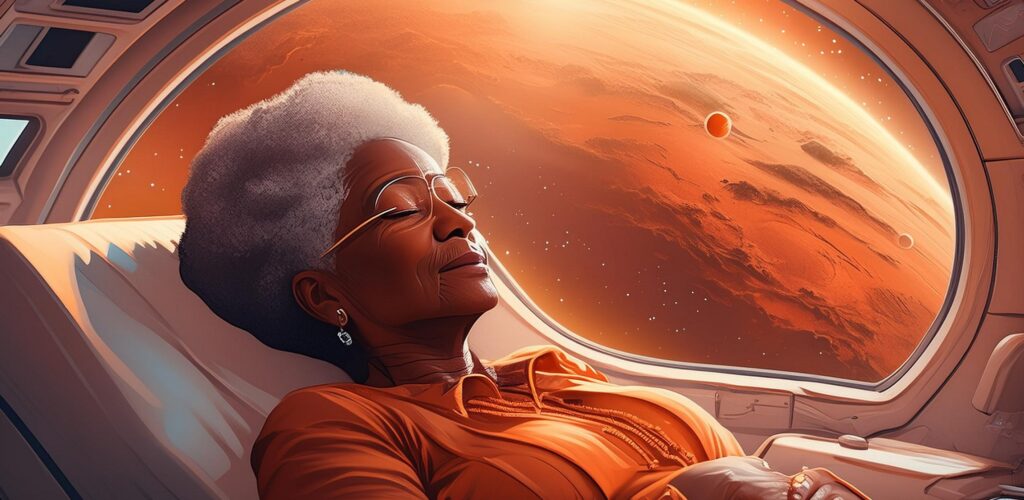
The funeral was hard. But the thing that helped me smile through the tears was counting the times Tom had sat on top of hotter pyres and lived.
Even those tiny Astras with their fridge-sized capsules on top. Sirius, the modules were called, as though they might carry us to that star. We called them hutches, because dogs had first ridden them into space.
And I’d laughed from atop my mighty Águia, laughed at the poor cramped nortistas. But Tom had been the first to leave the atmosphere, and no laughter of mine, nor my sister amazonas, could diminish that.
I remember how I yearned to meet him, this now-unfolded giant, newly returned to earth. When he came to our island Fernando de Noronha, headlining the American bragging tour, I volunteered to be his guide, to show him what we Brazilians could do.
That got out of hand, for we were both young; but my superiors never found out. My sister pilotas envied me, but they covered for me, too. It would have been so easy for Daiane, say, to have betrayed me, and taken my place on Belmira I—and everything would have been so different.
Three months later I rose into space, on Eagle’s wings. We had the equator, and pilotas were smaller, lighter. Thus, I, Gilma Pereira, became the first human to orbit the earth.
Happily, Thomas J Berens volunteered to escort me when I came to Florida. “We have bigger rockets than the Astras, now,” he bragged, eyes twinkling. And I twinkled back at him, for the phase of the moon was perfect for a safe launch and re-entry.
Tom finally got to orbit the earth, but by then we were launching our first space station, cobbled together from three Belmira capsules and a pair of spent fuel tanks.
Within two years the North Americans had skipped earth orbit, and my Tom was sitting on a cone of hot gas, touching down inside Aristarchus. I watched it from the inside of a fuel tank, sitting on nothing, with Daiane’s arm around me and mine around her, insanely jealous and crying our pride.
That heralded a brief era of international cooperation. Not that Tom had ever been uncooperative, but for five beautiful years we ran missions together. There was a genuine, altruistic, knowledge-sharing agenda, but there was also fear, for Russia and China had pulled back from the brink of war and were eyeing up the territorial possibilities of the solar system.
Together, Brazil and the Estados Unidos reached for Mars. We knew how to build space stations and they knew descents and ascents. So I got to orbit Mars first, but though we docked, Tom was on Mars before me.
And there, two hundred million kilometers from home, we became the first couple to marry on Mars. A symbol of the cooperation between our two countries. They fell out later, of course, but we never did.
It was our last first. We kind-of liked Mars, and there were others, younger others, who deserved their own firsts ‘out there.’ The first asteroid colony went to the Chinese.
On Mars we settled, loving and living our fragile lives on a hostile planet that we thought we’d tamed.
Until it killed Tom.
It was a sandstorm. Deimos station gave us bare warning, but Tom squeezed the error margin a little too hard, got lost, and ran out of air.
Tom has given his water back to the colony. His anhydrate was recycled chemically, and that funeral pyre was the last step. What remained was a calcium dust, which I have had sealed into a tiny urn.
***
Where have the years gone?
I left Mars just after my first grandson was born. I could see Tom in him, and it was too much for me to bear.
My Tom came with me.
I’m just your fancy, Gil, he says. It’s as near as he gets to telling me I have bats in the belfry. But I laugh.
“That was always true, you young fool.”
He’s not aged. Not now, at any rate. He is as I remember him from the beach on Fernando de Noronha. Naked and achingly beautiful.
That’s because we don’t do laundry, he insists. And beauty is in the eye of the beholder.
We banter. Mostly about who was first. It passes the time as we prowl the asteroids, looking for likely CHON bergs to drop on Mars.
Seriously. Ice they have, but they need the CHON. There’s a fine art to dropping a berg just right, braking round Venus, arriving back at Mars with just enough velocity to slot into orbit.
I have my own ship, my beloved Águia. It’s not really a ship as then-Tom would have understood it. It’s just a big ball of rock and CHON snow. It squirts CHON-ions for getting around, and I synthesize edible gloop from the snow.
And when Tom’s not strolling round the ship naked, he sits in his little urn, firmly anchored to the control panel.
I’m thinking, he says, about maybe we should go back and see how the great-grandkids are doing.
“Maybe,” I agree. But I don’t yet lay in a new course.
***
Tom’s right. It’s time to go home. Home, though—where is that? Earth I’ve almost forgotten. Cruel Mars was never home to me, though our great-grandchildren call it that.
The wheels turn in my tired old belfry and an idea pops out. Tom acts surprised.
You’re going out?
Like me, he knows ‘home’ was never a place, but the journey. And the best bits were always with Tom. Still are.
Jupiter? he asks. He’s not surprised. He knows.
We hope to see Jupiter yet, together, but my body is frail and the ion drive is slow and I can no longer ride a pyre.
Each day the computer sets me a little challenge. If I solve the problem, I journey on. If not, my last sleep awaits. My life, my choice.
“Good-night, Tom,” I say, though I am feeling very tired now. “Wake me when we’re there.”
Good-night, Gilma, he replies, but there’s a catch in his voice and a tear in his eye.
The softest of whispers: I will.
***
The Águia coasts through space, obeying its final programming. The ion drive is cold—the mathematics of space-time guarantee that the Águia will reach Jupiter in due course. And—always obeying the mathematics—it will follow the line of motion dictated, down into the well. A final ash-mingling pyre for Tom and Gilma, pioneers of space.
***
A glitch. A stray cosmic ray? But a 1 changed to a 0 here, and the error-correction did not catch it. Ions streamed from the drive, pushing, nudging the Águia onto a new course.
The Águia descended into Jupiter’s well, but somewhat further behind the planet than programmed. Jupiter lost a tiny amount of momentum. Obeying the mathematics, the Águia gained it.
The Águia was heading out.
A cosmic ray it might have been, but the urn on the Águia‘s control panel looked unreasonably smug.
Pick a star, Gilma, he says.
Edited by Sophie Gorjance.
William Campbell Powell lives in a small Buckinghamshire village in England. By day he works in software development. By night he writes YA, Speculative and Historical Fiction. His debut novel, EXPIRATION DAY, was published by Tor Teen in 2014 and won the 2015 Hal Clement Award for "Excellence in Children's Science Fiction Literature" - and Gabrielle de Cuir's narration of the audiobook won a 2016 AudioFile Magazine Earphones award.

